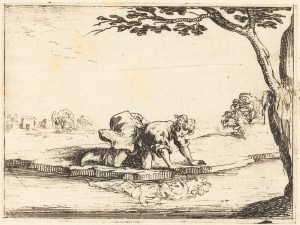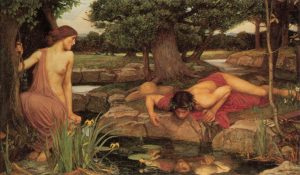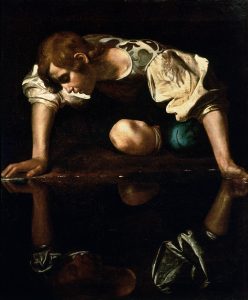21 Tiresias and Narcissus in Ovid

Bk III:316-338 The judgement of Tiresias
While these things were brought about on earth because of that fatal oath, and while twice-born Bacchus’s cradle remained safe, they say that Jupiter, expansive with wine, set aside his onerous duties, and relaxing, exchanging pleasantries, with Juno, said ‘ You gain more than we do from the pleasures of love.’ She denied it. They agreed to ask learned Tiresias for his opinion. He had known Venus in both ways.
Once, with a blow of his stick, he had disturbed two large snakes mating in the green forest, and, marvellous to tell, he was changed from a man to a woman, and lived as such for seven years. In the eighth year he saw the same snakes again and said ‘Since there is such power in plaguing you that it changes the giver of a blow to the opposite sex, I will strike you again, now.’ He struck the snakes and regained his former shape, and returned to the sex he was born with.
As the arbiter of the light-hearted dispute he confirmed Jupiter’s words. Saturnia, it is said, was more deeply upset than was justified and than the dispute warranted, and damned the one who had made the judgement to eternal night. But, since no god has the right to void what another god has done, the all-powerful father of the gods gave Tiresias knowledge of the future, in exchange for his lost sight, and lightened the punishment with honour.
Bk III:339-358 Echo sees Narcissus
Famous throughout all the Aonian cities, Tiresias gave faultless answers to people who consulted him. Dusky Liriope, the Naiad, was the first to test the truth and the accuracy of his words, whom once the river-god Cephisus clasped in his winding streams, and took by force under the waves. This loveliest of nymphs gave birth at full term to a child whom, even then, one could fall in love with, called Narcissus. Being consulted as to whether the child would live a long life, to a ripe old age, the seer with prophetic vision replied ‘If he does not discover himself’.
For a long time the augur’s pronouncement appeared empty words. But in the end it proved true: the outcome, and the cause of his death, and the strangeness of his passion. One year the son of Cephisus had reached sixteen and might seem both boy and youth. Many youths, and many young girls desired him. But there was such intense pride in that delicate form that none of the youths or young girls affected him. One day the nymph Echo saw him, driving frightened deer into his nets, she of the echoing voice, who cannot be silent when others have spoken, nor learn how to speak first herself.
Bk III:359-401 How Juno altered Echo’s speech
Echo still had a body then and was not merely a voice. But though she was garrulous, she had no other trick of speech than she has now: she can repeat the last words out of many. Juno made her like that, because often when she might have caught the nymphs lying beneath her Jupiter, on the mountain slopes, Echo knowingly held her in long conversations, while the nymphs fled. When Saturnia realised this she said ‘I shall give you less power over that tongue by which I have been deluded, and the briefest ability to speak’ and what she threatened she did. Echo only repeats the last of what is spoken and returns the words she hears.
Now when she saw Narcissus wandering through the remote fields, she was inflamed, following him secretly, and the more she followed the closer she burned with fire, no differently than inflammable sulphur, pasted round the tops of torches, catches fire, when a flame is brought near it. O how often she wants to get close to him with seductive words, and call him with soft entreaties! Her nature denies it, and will not let her begin, but she is ready for what it will allow her to do, to wait for sounds, to which she can return words.
By chance, the boy, separated from his faithful band of followers, had called out ‘Is anyone here?’ and ‘Here’ Echo replied. He is astonished, and glances everywhere, and shouts in a loud voice ‘Come to me!’ She calls as he calls. He looks back, and no one appearing behind, asks ‘Why do you run from me?’ and receives the same words as he speaks. He stands still, and deceived by the likeness to an answering voice, says ‘Here, let us meet together’. And, never answering to another sound more gladly, Echo replies ‘Together’, and to assist her words comes out of the woods to put her arms around his neck, in longing. He runs from her, and running cries ‘Away with these encircling hands! May I die before what’s mine is yours. She answers, only ‘What’s mine is yours!’
Scorned, she wanders in the woods and hides her face in shame among the leaves, and from that time on lives in lonely caves. But still her love endures, increased by the sadness of rejection. Her sleepless thoughts waste her sad form, and her body’s strength vanishes into the air. Only her bones and the sound of her voice are left. Her voice remains, her bones, they say, were changed to shapes of stone. She hides in the woods, no longer to be seen on the hills, but to be heard by everyone. It is sound that lives in her.
Bk III:402-436 Narcissus sees himself and falls in love
As Narcissus had scorned her, so he had scorned the other nymphs of the rivers and mountains, so he had scorned the companies of young men. Then one of those who had been mocked, lifting hands to the skies, said ‘So may he himself love, and so may he fail

to command what he loves!’ Rhamnusia, who is the goddess Nemesis, heard this just request.
There was an unclouded fountain, with silver-bright water, which neither shepherds nor goats grazing the hills, nor other flocks, touched, that no animal or bird disturbed not even a branch falling from a tree. Grass was around it, fed by the moisture nearby, and a grove of trees that prevented the sun from warming the place. Here, the boy, tired by the heat and his enthusiasm for the chase, lies down, drawn to it by its look and by the fountain. While he desires to quench his thirst, a different thirst is created. While he drinks he is seized by the vision of his reflected form. He loves a bodiless dream. He thinks that a body, that is only a shadow. He is astonished by himself, and hangs there motionless, with a fixed expression, like a statue carved from Parian marble.
Flat on the ground, he contemplates two stars, his eyes, and his hair, fit for Bacchus, fit for Apollo, his youthful cheeks and ivory neck, the beauty of his face, the rose-flush mingled in the whiteness of snow, admiring everything for which he is himself admired. Unknowingly he desires himself, and the one who praises is himself praised, and, while he courts, is courted, so that, equally, he inflames and burns. How often he gave his lips in vain to the deceptive pool, how often, trying to embrace the neck he could see, he plunged his arms into the water, but could not catch himself within them! What he has seen he does not understand, but what he sees he is on fire for, and the same error both seduces and deceives his eyes.
Fool, why try to catch a fleeting image, in vain? What you search for is nowhere: turning away, what you love is lost! What you perceive is the shadow of reflected form: nothing of you is in it. It comes and stays with you, and leaves with you, if you can leave!
Bk III:437-473 Narcissus laments the pain of unrequited love
No care for Ceres’s gift of bread, or for rest, can draw him away. Stretched on the shadowed grass he gazes at that false image with unsated eyes, and loses himself in his own vision. Raising himself a little way and holding his arms out to the woods, he asks, ‘Has anyone ever loved more cruelly than I? You must know, since you have been a chance hiding place for many people. Do you remember in your life that lasts so many centuries, in all the long ages past, anyone who pined away like this? I am enchanted and I see, but I cannot reach what I see and what enchants me’ – so deep in error is this lover – ‘and it increases my pain the more, that no wide sea separates us, no road, no mountains, no walls with locked doors.
‘We are only kept apart by a little water! Whenever I extend my lips to the clear liquid, he tries to raise his lips to me. He desires to be held. You would think he could be touched: it is such a small thing that prevents our love. Whoever you are come out to me! Why do you disappoint me, you extraordinary boy? Where do you vanish when I reach for you? Surely my form and years are not what you flee from, and I am one that the nymphs have loved! You offer me some unknown hope with your friendly look, and when I stretch my arms out to you, you stretch out yours. When I smile, you smile back. And I have often seen your tears when I weep tears. You return the gesture of my head with a nod, and, from the movements of your lovely mouth, I guess that you reply with words that do not reach my ears!
‘I am he. I sense it and I am not deceived by my own image. I am burning with love for myself. I move and bear the flames. What shall I do? Surely not court and be courted? Why court then? What I want I have. My riches make me poor. O I wish I could leave my own body! Strange prayer for a lover, I desire what I love to be distant from me. Now sadness takes away my strength, not much time is left for me to live, and I am cut off in the prime of youth. Nor is dying painful to me, laying down my sadness in death. I wish that him I love might live on, but now we shall die united, two in one spirit.’
Bk III:474-510 Narcissus is changed into a flower
He spoke, and returned madly to the same reflection, and his tears stirred the water, and the image became obscured in the rippling pool. As he saw it vanishing, he cried out ‘ Where do you fly to? Stay, cruel one, do not abandon one who loves you! I am allowed to gaze at what I cannot touch, and so provide food for my miserable passion!’ While he weeps, he tears at the top of his clothes: then strikes his naked chest with hands of marble. His chest flushes red when they strike it, as apples are often pale in part, part red, or as grapes in their different bunches are stained with purple when they are not yet ripe.
As he sees all this reflected in the dissolving waves, he can bear it no longer, but as yellow wax melts in a light flame, as morning frost thaws in the sun, so he is weakened and melted by love, and worn away little by little by the hidden fire. He no longer retains his colour, the white mingled with red, no longer has life and strength, and that form so pleasing to look at, nor has he that body which Echo loved. Still, when she saw this, though angered and remembering, she pitied him, and as often as the poor boy said ‘Alas!’ she repeated with her echoing voice ‘Alas!’ and when his hands strike at his shoulders, she returns the same sounds of pain. His last words as he looked into the familiar pool were ‘Alas, in vain, beloved boy!’ and the place echoed every word, and when he said ‘Goodbye!’ Echo also said ‘Goodbye!’

He laid down his weary head in the green grass, death closing those eyes that had marvelled at their lord’s beauty.
And even when he had been received into the house of shadows, he gazed into the Stygian waters. His sisters the Naiads lamented, and let down their hair for their brother, and the Dryads lamented. Echo returned their laments. And now they were preparing the funeral pyre, the quivering torches and the bier, but there was no body. They came upon a flower, instead of his body, with white petals surrounding a yellow heart.
Bk III:511-527 Tiresias prophesies Pentheus’s fate
When all this became known it spread the prophet’s fame throughout the cities of Achaia, and his reputation was high. Still, Pentheus, the son of Echion, in scorn of the gods, alone amongst all of them, rejected the seer, laughed at the old man’s words of augury, and taunted him with the darkness, and the ruin of his lost sight. He, shaking his white head in warning, said ‘How happy you would be if these dispossessed orbs were yours, so as not to see the sacred rites of Bacchus! Now the day approaches, and I see it is not far off, when the new god, Liber, son of Semele will come, and unless you think him worthy to be done honour in your sanctuaries, you will be scattered, torn, in a thousand pieces, and stain your mother, and her sisters and the woods themselves with your blood. It will be! You will not think the god worthy of being honoured, and you will lament of me, that in my darkness I have seen too far.’ Even as he speaks, Echion’s son thrusts him away. The truth of his words followed, the oracles of the prophet were performed.
Source: Ovid’s Metamorphoses, translated by Anthony S. Kline (https://ovid.lib.virginia.edu/trans/Metamorph.htm)